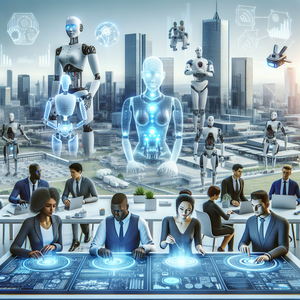Navigating the Uncharted: Career Transitions in the Age of Automation

Automation's impact on the workforce is profound and multifaceted. A report by McKinsey suggests that up to 375 million workers globally may need to shift occupational categories by 2030 due to technological advancements. This shift is not merely a threat; it represents an opportunity for individuals to reassess their skills and career trajectories. Many roles, particularly those involving routine tasks, are at risk of being automated, leading to a pressing need for professionals to adapt. However, this disruption also encourages exploration of new fields and the development of skills that align with the future job market. For instance, sectors such as healthcare, technology, and renewable energy are projected to grow significantly, driven by automation. This presents a chance for workers to pivot towards emerging roles that may offer greater job security and fulfillment.
Success Stories of Career Transitions
Real-life success stories often provide the most compelling insights into the potential for career transitions in an automated world. Consider Sarah, a former manufacturing technician who lost her job due to the implementation of robotic assembly lines. Instead of succumbing to despair, Sarah recognized the opportunity to upskill. She enrolled in community college courses focused on data analysis and programming, positioning herself for a role in a rapidly growing sector. Today, Sarah works as a data analyst for a tech company, finding her new career both rewarding and aligned with her interests. Similarly, John, a marketing manager, faced redundancy as companies increasingly automated digital marketing processes. Rather than remain stagnant, he leveraged his expertise to pivot into digital consulting. Through strategic networking and participation in workshops on emerging digital tools, John not only secured a new role but also established himself as a thought leader in the digital marketing space. Their stories exemplify the resilience and adaptability required to thrive in an age of automation.
Actionable Advice for Career Transitions
To successfully navigate career transitions in the age of automation, professionals can follow these actionable strategies: 1. **Identify Transferable Skills:** Conduct a thorough inventory of your skills and assess how they can transition into growing fields. For example, skills in project management, communication, and problem-solving are often applicable across various sectors. 2. **Invest in Lifelong Learning:** Continuous education is essential. Online learning platforms like Coursera, LinkedIn Learning, and Udacity offer courses that can help professionals acquire in-demand skills, enabling them to stay relevant in the evolving job market. 3. **Network Strategically:** Building connections in your desired field can open doors to new opportunities. Attend industry conferences, engage in online forums, and leverage social media platforms like LinkedIn to connect with industry professionals and mentors. 4. **Stay Informed About Emerging Fields:** Research industries projected to grow alongside automation, such as artificial intelligence, data science, cybersecurity, and renewable energy. Understanding these fields can help individuals identify stable career opportunities. 5. **Embrace a Growth Mindset:** Adopting a mindset that welcomes challenges and views setbacks as opportunities for growth is critical. Emphasizing resilience and adaptability can empower individuals to navigate the uncertainties of their career paths.
The age of automation presents unique challenges and opportunities for career transitions. By learning from the success stories of individuals who have successfully navigated these changes, professionals can find inspiration and actionable strategies to guide their own journeys. As the workforce continues to evolve, embracing lifelong learning, identifying transferable skills, and fostering a growth mindset will be essential for not just survival, but for thriving in the uncharted territories of the modern job market. The ability to pivot and adapt is no longer just a desirable trait; it is a critical skill for success in the age of automation. As we move forward, it is vital for individuals to take proactive steps towards meaningful work, ensuring that they are well-equipped to meet the demands of a rapidly changing world.
Data Analyst
Tech companies (e.g., Google, Amazon), financial institutions, and healthcare organizations
Core Responsibilities
Analyze data sets to identify trends and insights that inform business decisions.
Create visualizations and reports to communicate findings to stakeholders.
Collaborate with cross-functional teams to support data-driven strategies.
Required Skills
Proficiency in data analysis tools such as SQL, Python, or R.
Strong analytical and problem-solving skills.
Ability to interpret and present complex data in a clear manner.
Digital Marketing Consultant
Marketing agencies, e-commerce platforms, and startups
Core Responsibilities
Develop and implement digital marketing strategies to enhance brand presence and drive traffic.
Utilize SEO, SEM, and social media platforms to optimize marketing campaigns.
Analyze campaign performance and adjust strategies based on data insights.
Required Skills
Expertise in digital marketing tools such as Google Analytics, HubSpot, and social media management platforms.
Strong understanding of consumer behavior and market trends.
Excellent communication and creative skills for content creation.
Cybersecurity Specialist
Financial institutions, government agencies, and tech firms
Core Responsibilities
Monitor and protect an organization’s IT infrastructure from cyber threats.
Conduct risk assessments and vulnerability analysis to identify weaknesses.
Develop and implement security policies and protocols to safeguard sensitive data.
Required Skills
Knowledge of cybersecurity frameworks (e.g., NIST, ISO 27001) and security tools.
Strong problem-solving abilities and attention to detail.
Relevant certifications such as CISSP, CEH, or CompTIA Security+.
Renewable Energy Technician
Renewable energy companies, utilities, and government agencies focused on sustainability
Core Responsibilities
Install, maintain, and repair renewable energy systems such as solar panels and wind turbines.
Conduct site assessments and analyze energy production data.
Educate clients on energy efficiency and sustainability practices.
Required Skills
Technical knowledge of renewable energy technologies and systems.
Strong troubleshooting and mechanical skills.
Relevant certifications or training in renewable energy technologies.
User Experience (UX) Designer
Tech companies, design agencies, and startups focused on product development
Core Responsibilities
Conduct user research and usability testing to inform design decisions.
Create wireframes, prototypes, and user flows to enhance product usability.
Collaborate with developers and product managers to ensure design integrity throughout the product lifecycle.
Required Skills
Proficiency in design tools such as Sketch, Adobe XD, or Figma.
Strong understanding of user-centered design principles and methodologies.
Excellent communication skills for presenting design concepts and collaborating with teams.


